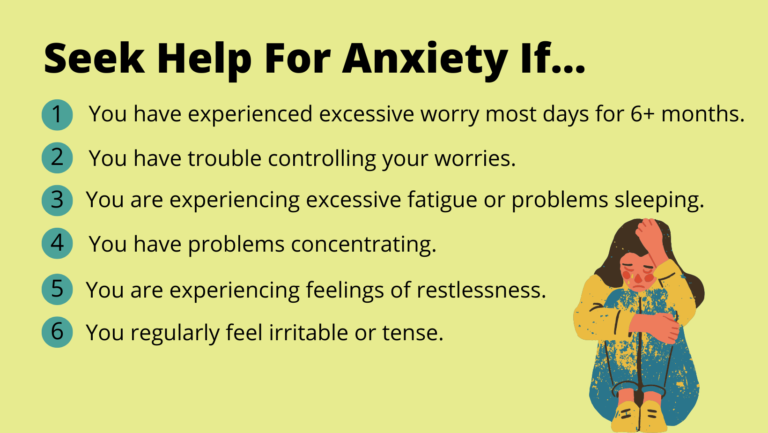Can Birth Control Cause Anxiety?
Many women experience anxiety disorders, which can be twice as common in women compared to men. Further, some women may experience anxiety and mood changes around the time of their period. Because hormonal birth control alters hormones related to your menstrual cycle, you may wonder if birth control can also affect your mood and anxiety. Learning more about the effects of birth control can help you understand how these contraceptives can affect your mental health.
How Hormonal Birth Control Works
Most forms of hormonal birth control contain two types of ingredients: an estrogen and a progesterone. However, some birth control only contains a progesterone component.
The progesterone component of birth control is the main ingredient responsible for preventing pregnancy. This is because it prevents ovulation by interfering with the body’s production of two hormones: follicle-stimulating hormone (FSH) and luteinizing hormone (LH). In addition, progesterone changes the consistency of the mucus in the cervix, making it unfriendly to sperm and making it harder for sperm to survive.
The estrogen component of birth control is also important, as it helps to interfere with the development of follicles in the ovary. Follicles contain the egg that would be released if ovulation occurred.
Can Birth Control Cause Anxiety?
Research is mixed on whether hormonal birth control can cause anxiety. Some studies seem to indicate that hormonal birth control may be linked to anxiety, while other studies do not have the same results and show no link. Still, anxiety is listed as a possible side effect in the package labeling of many different hormonal birth control products.
Even without birth control, hormonal fluctuations during the menstrual cycle may cause mood changes. For example, premenstrual dysphoric disorder (PMDD) and premenstrual syndrome (PMS) are linked to mood changes like anxiety before your period starts. Experts believe this is due to hormonal changes during the menstrual cycle that may involve the neurotransmitter serotonin.
What Birth Control Options Won’t Cause Anxiety?
Different hormonal birth control products have different risks of anxiety. For example, studies have shown that birth control products with the least risk of anxiety include products that:
- Contain a low amount of progesterone
- Are taken continuously, without placebo pills for menstrual bleeding days
- Are taken non-orally (for example, a birth control skin patch)
If you’ve experienced anxiety while using hormonal birth control, non-hormonal methods may be an option. Many non-hormonal options are available, and they can range from condoms to the Paragard copper IUD (intrauterine device) that is inserted in a doctor’s office and can last up to 10 years.
Can Going off Birth Control Cause Anxiety?
It is unclear if birth control itself is linked to anxiety. However, going off birth control can be linked to anxiety for reasons other than the birth control itself. For example, if you are sexually active and stop birth control, you may experience anxiety related to a potential pregnancy.
How Long Does It Take for Anxiety To Go Away After Stopping Birth Control?
Little data exists on how long it takes side effects like anxiety to go away after stopping birth control. However, a woman’s hormonal cycle typically normalizes within 90 days of stopping birth control.
Can Birth Control Potentially Help With Anxiety?
Birth control has not been linked to mood changes in women who start taking it. However, if a person is concerned about a possible pregnancy, being on birth control may help to alleviate some of the worry of becoming pregnant. In turn, this may reduce anxiety.
How To Cope With Birth Control-Related Anxiety
If you suspect you have birth control-related anxiety, the most important thing you can do is talk to your doctor. Your doctor may be able to adjust your birth control to reduce your anxiety. In addition, if your anxiety is cyclic and related to your menstrual cycle, your doctor may be able to prescribe an antidepressant specifically approved for PMDD. These can include:
- Sertraline
- Fluoxetine
- Paroxetine
If appropriate, your doctor may also recommend alternate ways of coping with your anxiety, such as yoga, mindfulness exercises or therapy.
When To Seek Help for Anxiety

When your anxiety feels like it is out of control, it can feel like your world is spiraling uncontrollably. However, it is important to know that you can seek help to control the symptoms. If you experience any of these symptoms of anxiety, you should speak with your doctor:
- Excessive worry most days for at least six months
- Having a hard time controlling your worries
- Problems concentrating
- Fatigue
- Sleep problems
- Restlessness
- Irritability
- Tense muscles
Supportive resources like Nobu can also be helpful for addressing anxiety and other mental health symptoms. With mindfulness exercises, journaling tools, mental health lessons and more, the free-to-use Nobu app can help you improve your mental health and overall well-being. For an additional fee, you can also connect with a licensed mental health expert to receive professional treatment. Download the Nobu app today, available for free on Apple and Android devices.

Edited by – Jonathan Strum
Jonathan Strum graduated from the University of Nebraska Omaha with a Bachelor’s in Communication in 2017 and has been writing professionally ever since. Read more.

Written by – Jessica Pyhtila, PharmD
Dr. Jessica Pyhtila is a Clinical Pharmacy Specialist based in Baltimore, Maryland with practice sites in inpatient palliative care and outpatient primary care at the Department of Veteran Affairs. She is a double board-certified Geriatric Pharmacist (BCGP)… Read more.

Medically Reviewed by – Dr. Angela Phillips
Angela is a licensed therapist and clinical researcher, and has worked in public, private, government, and not-for-profit organizations, across clinical and research-oriented roles. Angela’s clinical and research experience has included suicide prevention, cognitive behavioral… Read more.
- Paragard. “How long does the Paragard IUD last?” Accessed June 27, 2022.
- Drugs.com. “Estradiol and Norethindrone Tablets.” May 1, 2022. Accessed June 27, 2022.
- Schaffir, Jonathan; Worly, Brett L.; Gur, Tamar L. “Combined hormonal contraception and its effects on mood: a critical review.” The European Journal of Contraception & Reproductive Health Care, August 15, 2016. Accessed June 27, 2022.
- Cooper, Danielle B.; Patel, Preeti; Mahdy, Heba. “Oral Contraceptive Pills.” StatPearls, February 26, 2022. Accessed June 27, 2022.
- Hall, Kelli Stidham; Steinberg, Julia R.; Cwiak, Carrie A.; et al. “Contraception and Mental Health: A Commentary on the Evidence and Principles for Practice.” American Journal of Obstetrics and Gynecology, December 12, 2014. Accessed June 27, 2022.
- Office on Women’s Health. “Premenstrual dysphoric disorder (PMDD).” February 22, 2021. Accessed June 27, 2022.
- PsychDB. “Generalized Anxiety Disorder.” Accessed June 27, 2022.
- Nillni, Yael I.; Toufexis, Donna J.; Rohan, Kelly J. “Anxiety Sensitivity, the Menstrual Cycle, and Panic Disorder: A Putative Neuroendocrine and Psychological Interaction.” Clinical Psychology Review, July 26, 2011. Accessed June 27, 2022.